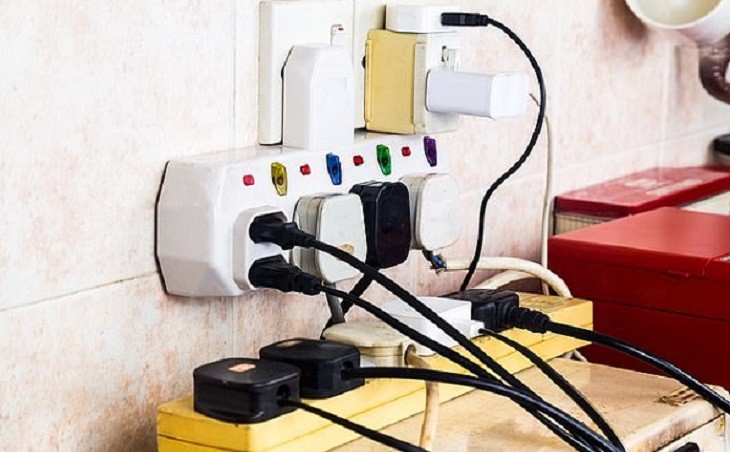The consequences of fires and explosions can be devastating, often resulting in significant losses of life and property, as well as heartbreaking aftermath. To minimize the risk of such incidents, it is crucial to raise awareness and avoid certain habits that can lead to these disasters.
1. Avoid clustering large electrical appliances
In small living spaces, it is common to place large electrical appliances (such as televisions, refrigerators, and washing machines) close to each other. However, this practice can hinder proper heat dissipation due to limited space. If one appliance experiences an electrical fault and sparks, it can easily ignite the others, leading to a high risk of fire and explosion.
Additionally, refrain from plugging multiple devices into a single outlet. Overloading an electrical outlet can lead to overheating and electrical faults. It is advisable to install a sufficient number of outlets around the house and separate them to ensure safety.

2. Avoid using old and worn-out electrical cords and outlets
Old and worn-out electrical cords and outlets can pose a serious safety hazard. They may have exposed wires, increasing the risk of electrical shocks. Additionally, if the heat from the wires comes into contact with flammable materials, it can easily lead to a fire. Therefore, it is essential to replace old cords and outlets with new ones to ensure the safety of your home and family.
3. Unplug electrical devices when not in use
Many people tend to leave their electrical devices plugged in even when they are not in use. A common example is leaving phone and laptop chargers plugged into the socket for convenience. However, this practice can be dangerous as electrical faults and fires can occur at any time. It is crucial to unplug devices when not in use and to be vigilant about fire hazards, especially when charging electronic devices.
4. Overnight charging of electric vehicles
Electric bicycles typically require 4-6 hours of charging, while electric motorcycles need 6-8 hours. As a result, some people opt to charge their vehicles overnight. While this may seem convenient, it can be risky if the vehicle’s battery is low-quality or if the charger is not the original one provided by the manufacturer. Using inappropriate chargers or batteries of inferior quality can lead to electrical faults, battery explosions, and subsequent fires.
Furthermore, it is crucial to keep vehicles and flammable substances, such as gasoline and oil, away from cooking areas. Fire can easily spread to adjacent equipment, leading to a blaze.

5. Neglecting the stove while cooking
Being distracted while cooking is a common cause of fires and explosions. It only takes a moment of inattention for a fire to spread to surrounding objects. Therefore, it is crucial to stay focused and attentive when cooking. Always check the stove, oven, and gas connections after cooking and before leaving the house.
Additionally, keep flammable items, such as flour, lighters, cooking oil, plastic bags, and other combustible materials, away from the stove to minimize the risk of fire and explosions.
6. Avoid burning incense and offerings indoors
Burning incense and offerings indoors can have serious consequences. The wind can blow the embers and cause them to land on other objects, potentially starting a fire. Therefore, it is crucial to avoid burning incense and offerings inside your home. Additionally, be cautious when using scented candles or incense sticks, and always extinguish them before leaving the house.
5 Things You Should Never Place Near Your Stove, No Matter What
The kitchen is the heart of the home, but it can also be a dangerous place if not used safely. Many families have a bad habit of convenience, often keeping small utensils close to the stove without realizing the potential hazard. It’s time to break this harmful habit and create a safer kitchen environment. By being mindful of where we place items and taking extra precautions, we can enjoy our cooking experiences without putting ourselves at risk.



































